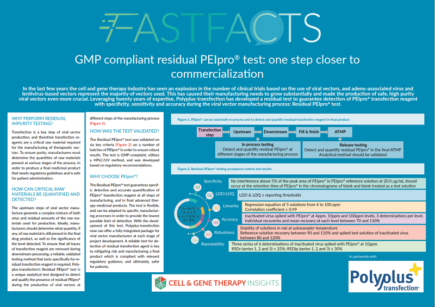Summary
Polyplus-transfection has developed a residual test to guarantee detection of PEIpro® transfection reagent with specificity, sensitivity and accuracy during the viral vector manufacturing process: Residual PEIpro® test.
Residual PEIpro® test
In the last few years the cell and gene therapy industry has seen an explosion in the number of clinical trials based on the use of viral vectors, and adeno-associated virus and lentivirus-based vectors represent the majority of vectors used. This has caused their manufacturing needs to grow substantially and made the production of safe, high purity viral vectors even more crucial. Leveraging twenty years of expertise, Polyplus-transfection has developed a residual test to guarantee detection of PEIpro® transfection reagent with specificity, sensitivity and accuracy during the viral vector manufacturing process: Residual PEIpro® test.
See our poster following this link: GMP compliant residual PEIpro test: one step closer to commercialization
To complete this poster, Malik Hellal Senior Scientist in Chemistry at Polyplus-transfection, presented in a video our Residual PEIpro® test:
- Why perform residual impurity test?
- How can critical raw materials can be qualifed and detected?
- How was the test validated?
- Why choose PEIpro®?
Copyright:
GMP compliant residual PEIpro® test: one step closer to commercialization
Cell & Gene Therapy Insights 2020; 6(10), 1455.
10.18609/cgti.2020.158
PUBLISHED: 3 NOVEMBER 2020, FASTFACTS

